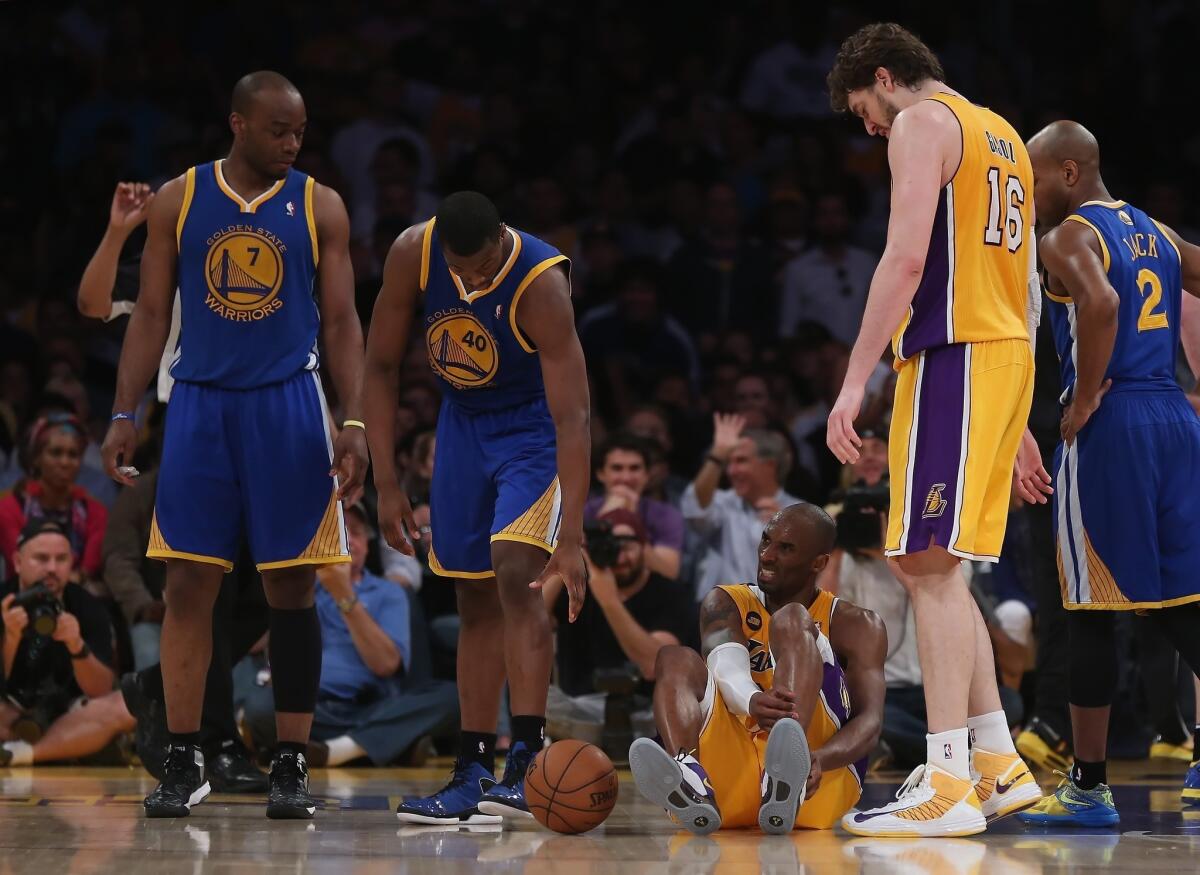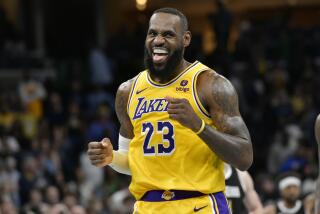Understanding the Lakers’ reluctance to amnesty Kobe Bryant

- Share via
Lakers General Manager Mitch Kupchak was clear Saturday that the team has no intention to use their one-time amnesty on Kobe Bryant.
“That’s not even something that we’ve discussed,” Kupchak said. “That’s the furthest thing from our mind right now.”
Bryant, who tore his left Achilles’ tendon Friday night, underwent surgery Saturday and is projected to be out for a minimum of six to nine months.
Between July 10 and 17, the Lakers can amnesty a single player who was under contract before the 2011-12 season. The only four Lakers who qualify are Pau Gasol, Steve Blake, Metta World Peace and Bryant.
The team would still pay an amnestied players’ salary, but the amount wouldn’t count against the Lakers’ salary cap or its luxury-tax computation.
The Lakers cannot re-sign them throughout the duration of their contract. Since all four are going into the final years on their respective deals, the Lakers would be able to try to bring an amnestied player back in July 2014, but they would lose their Bird rights in the process.
The Bird rights stipulate that when Bryant’s contract expires in 2014, the Lakers can pay him more than any other team in the league to retain him. Amnesty takes that advantage away from the Lakers and puts them on equal footing with other suitors.
Additionally, once a player is placed on amnesty waivers, teams under the cap are given an opportunity to bid on that contract. For instance, if Bryant were amnestied, the Cleveland Cavaliers could put in a bid of $1.4 million and his contract would be acquired by the Cavaliers.
Bryant can try to fight it by saying he won’t report. He can argue that his no-trade clause applies. Even if he had a case, this is not an appealing scenario the Lakers want to create.
Instead, Kupchak expects Bryant to be on the front end of the return timeline. Even if Bryant ends up in a similar situation as Derrick Rose, whose comeback from a knee injury sustained in April 2012 has yet to happen, the Lakers won’t know that until long after the July decision is made.
If Bryant isn’t going to play next season, an argument can certainly be made that the Lakers should amnesty him. Based on the team’s expectation that he’ll be back in the October-December range, they are likely to keep their All-Star guard under contract, even though he’s owed more than $30 million.
The Lakers aren’t an organization whose basketball decisions start and stop with saving the most amount of money.
While the organization is faced with a serious luxury-tax hit next season, potentially in the $70-million to $119-million range if they keep the team together, they might find other ways to shrink their tax burden.
Trades, opt-outs and amnesty could all come into play, but none are expected to include Kobe Bryant.
ALSO:
Injury could be the beginning of the end for Lakers’ Kobe Bryant
Exclusive: Doctor who performed Kobe Bryant’s surgery is optimistic
Steve Nash to sit against Spurs; Lakers might re-sign Andrew Goudelock
Email Eric Pincus at eric.pincus@gmail.com and follow him on Twitter @EricPincus.
More to Read
All things Lakers, all the time.
Get all the Lakers news you need in Dan Woike's weekly newsletter.
You may occasionally receive promotional content from the Los Angeles Times.






